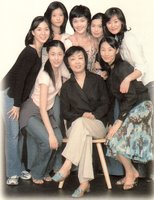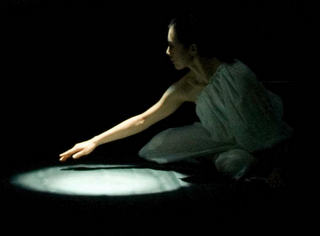Poem by Han Yong-un performed by Youngju Kang
 This remarkable artist has painted a masterpiece of dance where movement unfolds like brushstrokes and choreographic calligraphy... her dance group is Nuhui, a dance troup that has served as the canvas for Kim's explorations of movement, color, space, and structure. Kim has fashioned a cultural icon in her realization of the poem, extracting profound elements of Zen Buddhism to explore the essence of the poem and the spirituality of the Korean Psyche.
This remarkable artist has painted a masterpiece of dance where movement unfolds like brushstrokes and choreographic calligraphy... her dance group is Nuhui, a dance troup that has served as the canvas for Kim's explorations of movement, color, space, and structure. Kim has fashioned a cultural icon in her realization of the poem, extracting profound elements of Zen Buddhism to explore the essence of the poem and the spirituality of the Korean Psyche.Kim has always had a sensitive eye, designing her own graphics and controlling every nuance of color and costume much as the great film director Antonioni. Her choreography frequently takes on the vocabulary of cinema, and Kim often creates video versions of the dances that employ cinematic effects such as cross dissolve and superimposed images.
This new work is closely related to the narrative structure of Han Yong-un's poem. As we listen to the performance of the poem, we can hear the textures and rhythms that find their way into movement and sound. Youngju Kang's eloquent rendering of Han's poem creates a sense of wonder and awe, and the sheer beauty of the language permeates our sensibiity in a profound awareness of mystery and revelation.
Here is a synopsis of the dance structure:
Prologue.
Dancers : Kim Yul Hee, Pak Koung Eun, Kim Whal Ran, Bea Jin Yl, Lee Jung Min, Lee Eun Jung, Lee Yoon Kyoung, O Ji Young, Kim Yuen Hee, Yoon Ji Yang. Musician : Son Bum Ju playing a reed instrument (sort of traditional pipe)
Act I. [Sae Oul] - green fountain from east / sound of water and rainfall...
Dancers : Yoon Jueng Min, Kim Yul Hee, Pak Koung Eun, Kim Whal Ran, Bea Jin Yl, Lee Jung Min, Lee Eun Jung
Act II. [Mu Ji Gae Sal] - over the rainbow / Gayageum
Act III. [Nat Dal] - moon rising in the afternoon / Voice
Act IV. [Mu Geoung Ji Hea] - everlasting being / Korean traditional fiddle (violin)
Prologue -- Kim draws upon an austere palette for sound, the sounds of an ancient windpipe, as though summoning the spirit of Korea to attend a celebration. Sun Bum Ju produces an inspired melody that penetrates and envelops the emptiness. The dancers awaken to discover themselves in the midst of antiquity merging with the present..not only awaken but seem to be created out of the mists and textures of the infinite moment. The sounds of the windpipe are evocative, as though Silence itself had discovered its own true voice. The music fades into darkness dissolved by a steady, refreshing rain.
Act I -- The rain brings new images of dancers around fountains flowing from some infinite wellspring... the dancers are vertical with an outstretched arms extending their reach as though gathering the rain. The way they surround the fountains evokes the image of a temple, the guardians of the flowing force of life...Sounds of distant thunder welcome the ritual, the quiet celebration of an undefined presence... the rain yields to the sound of water flowing...

Act II -- a cascade of sounds, the ancient harplike sounds of the Kayageum spill through the space while a lone traditional flute soars through the texture like a rainbow. Flowing water in fountains sustain us, the ebb and flow of life reach to the source of our identity in a cold and alien universe. The water welcomes us, nourishes us, delights in our delight. A swirl of sound encasing the flute...dancers swirling...lingering...in final gestures of celebration...a final touch of the fountain... withdrawing and fading into the clouds concealing a revelation...
Act III -- Wind and the sound of the surf rip through the terrain, the dancers run forward like the wind sweeping the ocean... and in the wind we hear the voice of I Don't Know, the text now transformed into a profound prayer in a most expressive and sustained performance, beautifully drawn out in a flowing musical line sustained by the wind and waves in lingering counterpoint.The dancers attend the poem in awe as worshippers of the source of wonder... reaching a sense of supreme ecstacy... above, butteflies hover in evocation of an endless sky...
Act IV -- A harbor bell sounds in the night... we see the ocean in the distance and the waves upon the beach, accompanied by the incessant sounds of the surf... almost imperceptibly we see the dawn slowly glowing and dancers emerging from the ocean like life itself...the dancers are part of the ocean... a Korean fiddle creates a soliloquy with the surf, a comment on the mystery and awe of the night, the endless ocean, and the slowly emerging enlightenment of the dawn... a light in the center of the stage flickers through the shadows and movements of the dancers and we sense this to be the source of ourselves, forever enclosed within our wonder and embrace... and yet, in the enveloping darkness our wonder continues and echoes... I Do Not Know... I Do Not Know... I Do Not Know...
The sculpture work of You, Young-kyo is inspired, the stone pools and butterflies add to the spiritual presence of the work. The composer and music director Hwang, Byoung-ki helps set the musical texture that melds with the layers of visual richness and structured movement.
Yuoul, the Kayageum ensemble, adds color and antiquity to the over all impression of sound. The sound design by Kim, Tae-gun establishes an ambience that envelops in the dance in the resonance of rain, wind, thunder, and silence. The baritone Sin Kyoung-ok provided one of the most remarkable performances in his singing of the poem, an inspired and inspiring performance. The poem was set to music by Hwang, Byoung-ki(he put the rhythm on the poem as lylic song). Jeung, Soo-nyun's Korean fiddle cuts through the surf and wind of the final movement like a spontaneous prayer. These artists and the dancers provided an extraordinary immediacy that transformed the many parts into an integral whole.
Kim Myung Sook has created a tour de force of movement, sound, and shape that provides a framework of introspection and revelation. The dancers combine with the musicians, the sculptor, the sound and light designers to weave an inspired tapestry of a work that fuses the past and present, the unique with the universal. The grace, agility, and sheer virtuosity of the dancers is tempered by the deep respect bestowed upon the work by these performing artists. Each dancer establishes a distinct individual quality while contributing to the whole.
Kim does not attempt to answer the questions of the poem. She goes beneath the answers to the essence of the questions themselves and provides insights into the fundamental resonance of ourselves within the world that is our dwelling place.
